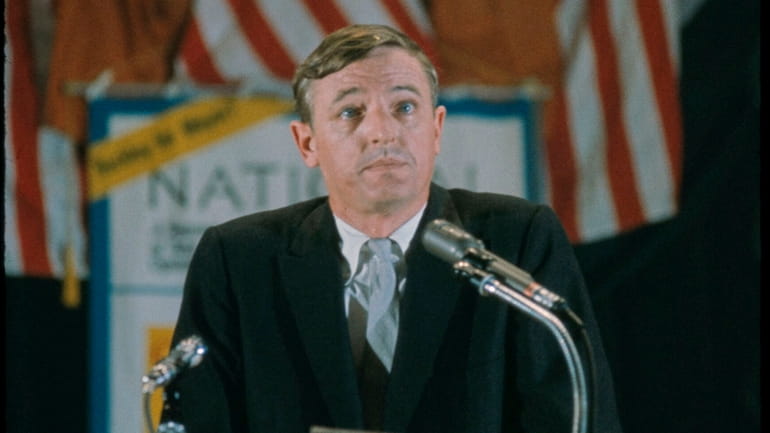'The Incomparable Mr. Buckley' review: Highly watchable portrait of a superb communicator

"American Masters: The Incomparable Mr. Buckley" examines the life of William F. Buckley, Jr. Credit: Library of Congress Prints and Photographs Division
DOCUMENTARY "American Masters: The Incomparable Mr. Buckley"
WHEN|WHERE Friday at 9 p.m. on WNET/13
WHAT IT'S ABOUT This bookend broadcast to last week's “American Masters'' portrait of Daniel Patrick Moynihan covers William F. Buckley, Jr.'s (1925-2008) life and central role in the creation of the modern conservative movement — from the 1951 publication of “God and Man at Yale,” the 1955 launch of National Review, and the quixotic 1965 run for New York mayor against John Lindsay, as well as the many years on “Firing Line.”
The film also covers some of Buckley's regrettable lapses, notably the 1965 Cambridge Union debate with James Baldwin and the one on ABC in 1968 with Gore Vidal, where he threatened to “sock you in your [expletive] face.” There's also some exploration of Buckley's political thinking, and how that influenced Ronald Reagan. With lots of commentary, from the National Review's Richard Brookhiser and Jay Nordlinger, and Buckley biographer Sam Tanenhaus, among others.
MY SAY “The Incomparable Mr. Buckley” makes an unusual stylistic choice by refusing to divert its focus even once from the subject at hand — the incomparable Mr. Buckley. Rather than toggling back and forth to a talking head (even when the head belongs to his also-famous son, Christopher) the film maintains a tight grip on Buckley himself: That voice, the cadence, the wit, the barbs and those arctic-blue eyes, which seemed to roll back into his head, as if to make visual contact with something he was about to say.
This approach seems about right. Because of “Firing Line” (1966-99), Buckley was so famous for so long that he seemed to occupy his own TV alt-universe to Johnny Carson's. He wrote some 50 books, thousands of columns, and who-knows-what-else, but what survives of him, at least in our collective memory, is that whole inimitable on-screen package. This film covers much (albeit not nearly enough) of the career and philosophy, but captures the essence of how he managed to matter for so long: Buckley was a superb communicator, who commanded TV screens during a stretch of recent American history when they were about the only things worth commanding.
In spite of that, “Incomparable” also establishes how this long career could have gone sideways any number of times. He was on the wrong side of history occasionally and badly — most egregiously in his support for Southern segregation in the mid-1950s — and on the right side too, when he got his brother, Sen. James Buckley, to call for Richard Nixon's resignation.
Moreover, some of the spirit of Buckley's brand of conservatism lives on in the MAGA movement, too. As to what he would actually think of this movement and its leader, his son Christopher advises viewers to read some of his books and columns. Translation: “Pops'' would look dimly upon any politician who seeks to reap the whirlwind, then echoes his father's line when asked what he would have done had he won the New York mayoral race: “He might just have said, 'demand a recount.'”
But the film can't resist the irony of pointing out that the DNA of “Firing Line” was ultimately patched into Fox News, and that Buckley reaped some whirlwinds of his own. Per one observer, “Buckley understood it was part of his role to keep a lid on the dark energies that fueled the conservative movement, but not to repress them entirely because it was those kinds of resentments'' that gave the movement its power. “The Incomparable Mr. Buckley'' thus ends with a vague and disquieting notion that perhaps he wouldn't demand a recount after all.
BOTTOM LINE Highly watchable — just as Buckley would have preferred.
